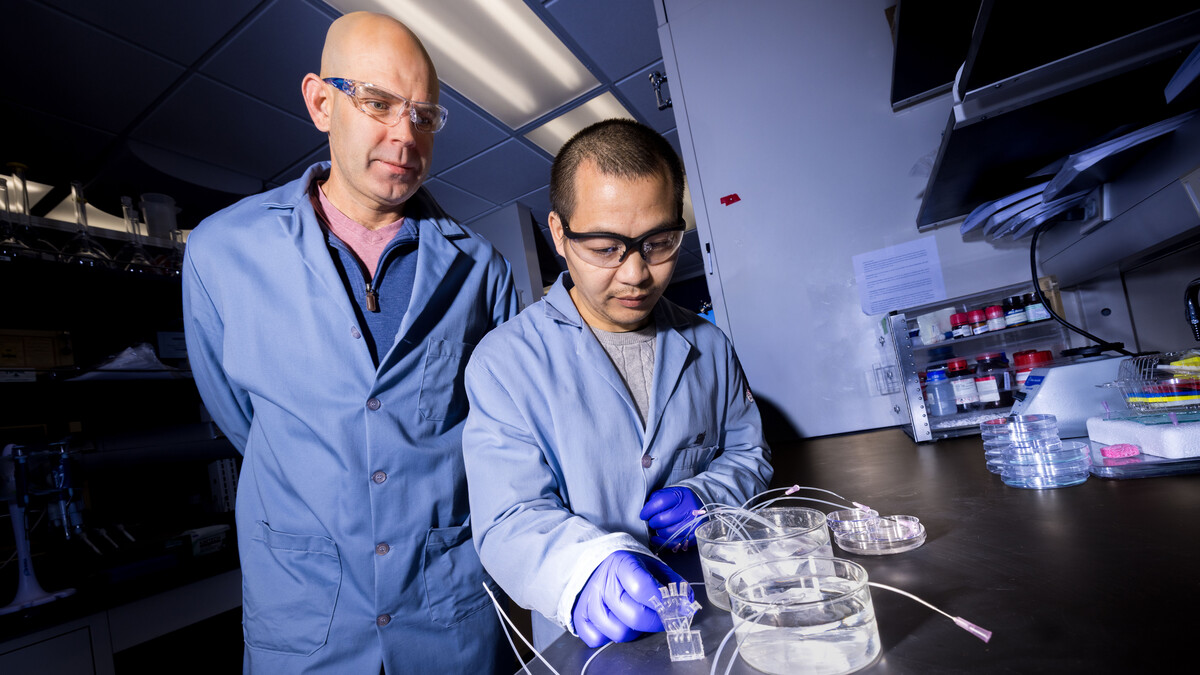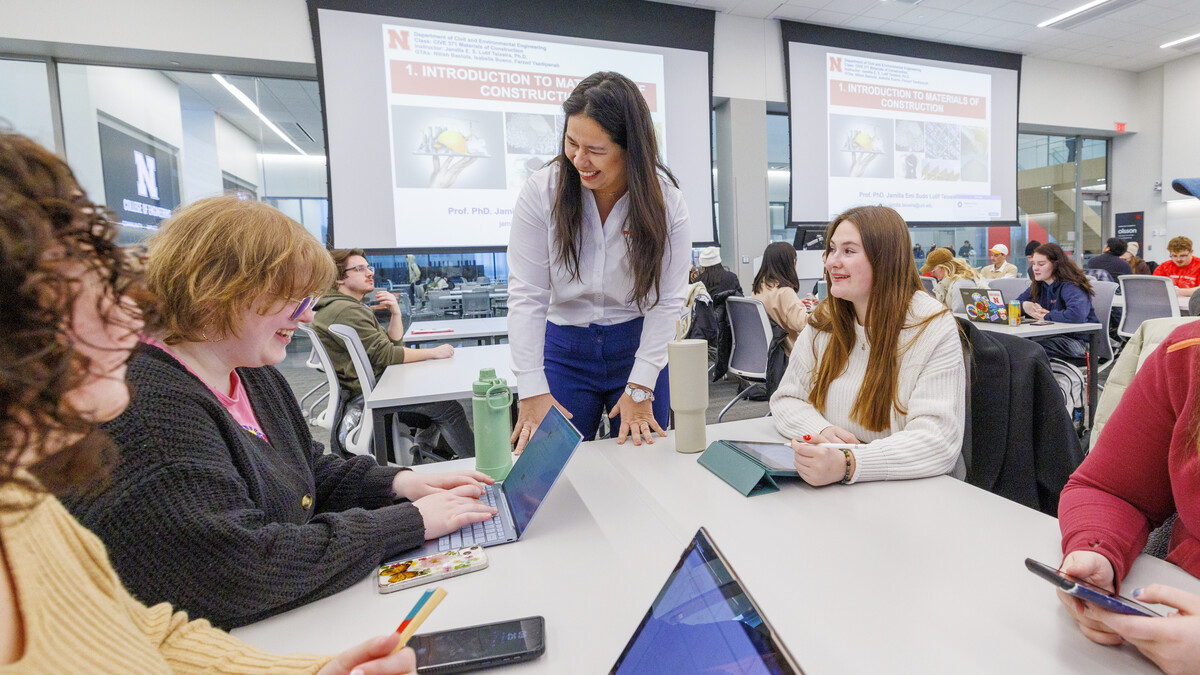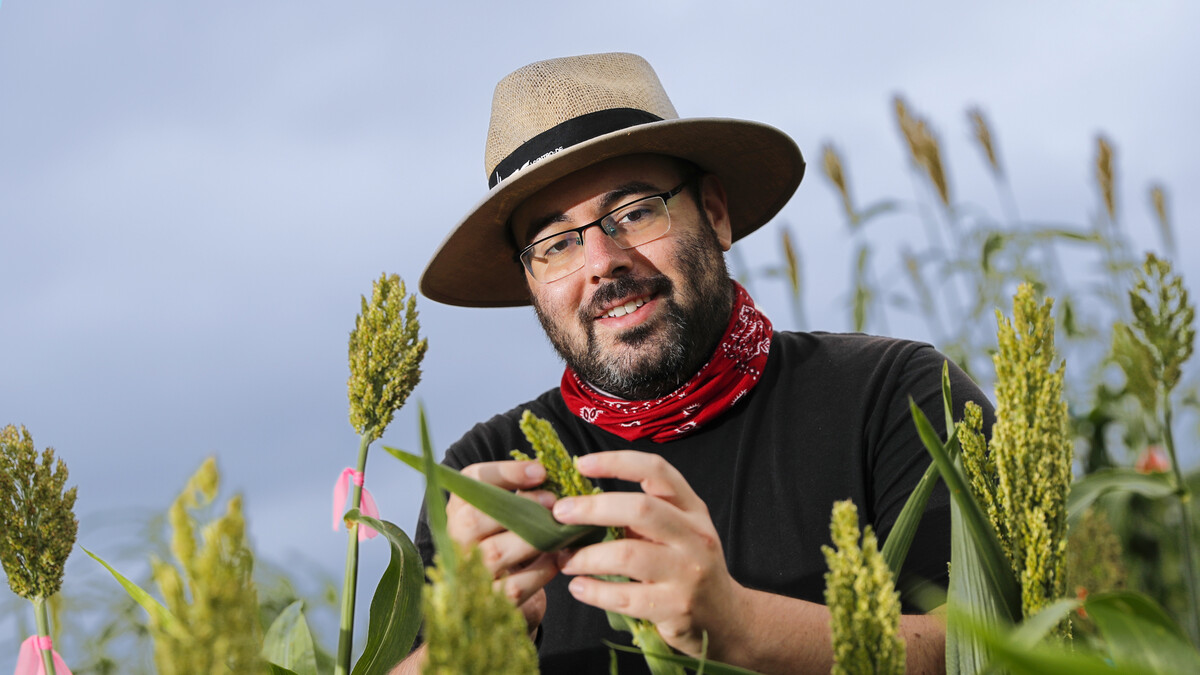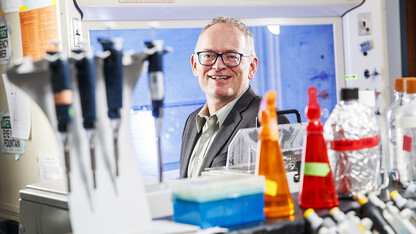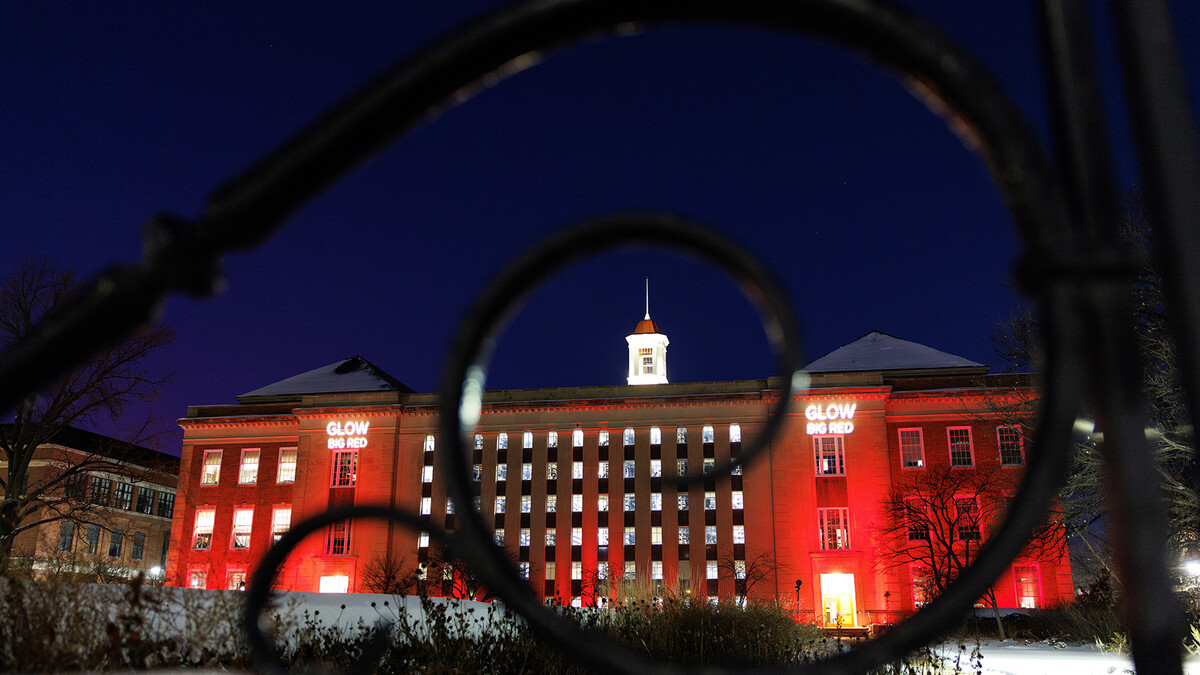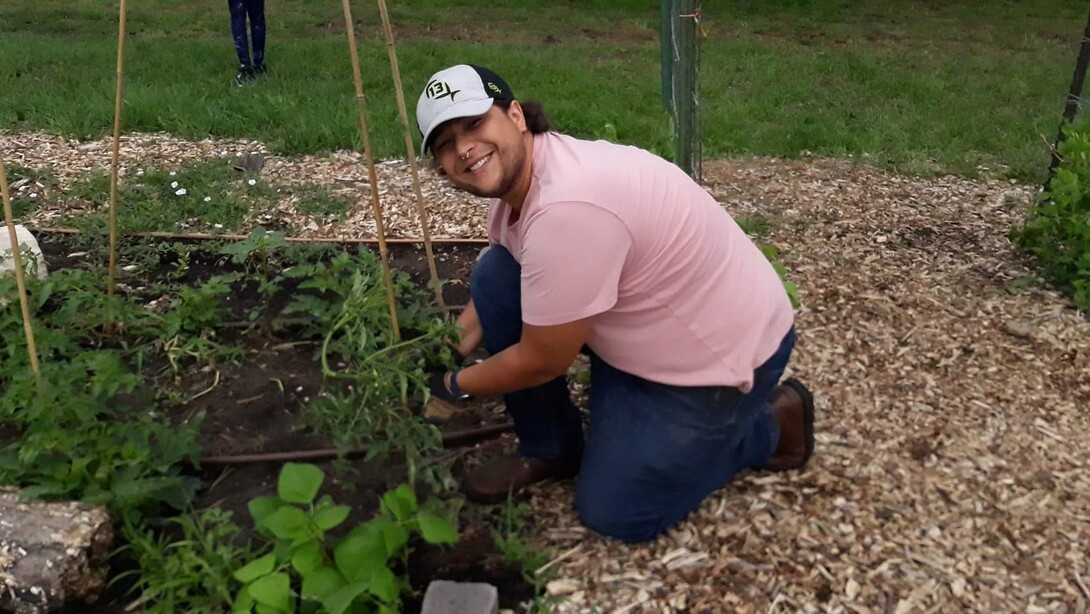
Originally from Brighton, Colorado, Timothy Thielen returned to Nebraska to pursue a master’s in entomology.
An opportunity in the University of Nebraska–Lincoln's Tribal Extension Office changed their trajectory. Now a program coordinator with the office, Thielen works hand-in-hand with Indigenous communities across the state, blending passions for education, Indigenous culture and community development.
The University Communication and Marketing team reached out to Thielen and asked how the work impacts the Indigenous community and beyond.
What prompted you to work as a program coordinator in Extension, specifically the UNL Tribal Extension Office?
My journey to the UNL Tribal Extension Office began unexpectedly. Initially, I returned to UNL for a master’s in entomology, but an opportunity to coordinate the Indigenous Youth Food Sovereignty Program changed my trajectory. This role opened my eyes to the profound impact I could have on the community. Working with Lincoln’s Indigenous youth ignited a passion I hadn’t anticipated. When a position opened in the Turtle Island Trade Coalition within UNL’s Tribal Extension Office, I knew it was where I belonged. This role allows me to blend my passion for education, Indigenous culture, and community development into a deeply fulfilling career. The Indigenous Youth Food Sovereignty Program remains close to my heart, as it directly connects youth with their ancestral roots through agriculture and sustainable practices.
How does the Indigenous Youth Food Sovereignty Program work and how does it garner appreciation for learning about a student's ancestry?
The Indigenous Youth Food Sovereignty Program is a transformative initiative that meets every Saturday morning. It’s designed to reconnect Indigenous youth, from middle school to college age, with their cultural heritage through hands-on agricultural experiences and educational sessions.
Our day starts with teachings from Dr. Theodore Hibbeler, my mentor, who shares Indigenous wisdom and perspectives. We then dive into discussions on Indigenous literature, such as Robin Wall Kimmerer’s "Braiding Sweetgrass," exploring themes of identity, connection to the land, and traditional foodways.
The heart of the program is our Indigenous garden, where students apply ancestral techniques to grow food. This practical experience not only teaches them how to feed themselves and their families, but also instills a deep appreciation for their cultural heritage. Any surplus produce is shared with the students’ families or donated to community events like powwows, addressing food insecurity while spreading cultural awareness.
The program offers invaluable life skills and cultural knowledge. Students learn inventory management, sustainable farming practices and the importance of food sovereignty. The impact goes beyond the garden — I’ve witnessed students build their own businesses, like one who now roasts coffee, supported by their experience in the program.
Personally, I’ve seen the program spark a renewed interest in Indigenous identity and community engagement among participants. It led to the formation of a new tribal youth group and inspired students to explore their heritage further. The program is more than just growing food; it’s about cultivating a sense of belonging, pride in one’s roots, and a commitment to community well-being. In the future, the program is looking at selling herbs and ceremonial plants as well as produce via farmer’s markets.
Can you speak to the community impact of the program beyond what it means for the students in it?
The Indigenous Youth Food Sovereignty Program’s impact extends far beyond our student participants. It’s a response to the broader challenges facing Lincoln and Nebraska as a whole. Lincoln is considered a food desert, with limited access to fresh, nutritious food, especially for our Indigenous communities. Moreover, Nebraska’s food system lacks resilience, heavily relying on imports.
Our program addresses these issues on multiple fronts. By teaching roughly 25 students and their families about growing food, we’re creating a ripple effect of knowledge and self-sufficiency. These families now understand where their food comes from and how to produce it themselves, a crucial step towards food sovereignty. Our work focuses on growing as much nutritionally varied food as densely as possible using traditional methods such as versions of the Three Sister’s and Milpa.
The program’s reach goes further. Our donations to local powwows and food banks, like the 400 pounds of peppers we once contributed, directly combat food insecurity in the community. These actions not only provide immediate relief but also raise awareness about the importance of local, sustainable food systems.
Moreover, the program has sparked wider community engagement. We’ve seen former students start their own food-related businesses, like our coffee roaster, contributing to the local economy. The relationships formed through the program have led to the creation of a new tribal youth group, fostering stronger community ties and cultural pride.
In essence, the program is planting seeds of change — literally and figuratively. We’re not just growing food; we’re growing a movement toward a more resilient, culturally rich, and self-sufficient community. Each vegetable we grow and share is a step towards transforming Lincoln’s food landscape and empowering our Indigenous community.
You’re also involved in the Turtle Island Trade Coalition. Can you speak to the goal of the program and the work you’ve done so far?
The Turtle Island Trade Coalition is at the heart of my current work, and it’s a project I’m deeply passionate about. Our mission is twofold — to revitalize traditional intertribal trade networks and to empower contemporary Indigenous businesses.
The coalition’s vision, inspired by Dr. Hibbeler, harkens back to pre-colonial times when Indigenous trade routes spanned from the Arctic to South America. We aim to recreate this robust network, adapted for the modern era, to strengthen economic ties between Indigenous communities.
Currently, we’re working with six Indigenous businesses — four for-profit entities and two non-profits. My role is multifaceted, focusing on providing comprehensive support to help these businesses grow and thrive. We offer each member:
- An online presence through our dedicated website
- Access to Nebraska Market Maker and National Market Maker, platforms that showcase their products to thousands of potential customers
- Marketing support, including logo design, flyer creation, and strategic planning
- Business development assistance, such as help with LLC formation and insurance acquisition
- Grant applications
- Free workshops, materials and admission to our conference
Recently, I’ve been helping members apply for the Business Builder Grant and guiding them through the process of establishing LLCs. We’ve also supported members in applying for initiatives like the High Tunnel Initiative and creating branding materials.
The next phase of our work involves facilitating connections between these businesses to encourage intertribal trade and collaboration. We’re also expanding our reach by attempting to connect with the 16 federally recognized tribes in our work area, starting with those in Nebraska.
The Turtle Island Trade Coalition is more than just a business support program. It’s a movement to reclaim economic sovereignty, food sovereignty, the continued preservation of cultural heritage, and build a strong, interconnected network of Indigenous businesses. Every day brings new challenges and opportunities, and I’m honored to be part of this important work.
In addition to your work with Extension, you’re also working toward a master’s degree. What interests you most about entomology and is there anything in particular you hope to do in the field?
While my academic journey has taken an unexpected turn, my passion for entomology remains strong. I was initially drawn to this field because insects play a crucial role in our ecosystems, influencing everything from plant-pollinator interactions to soil health and biodiversity.
What fascinates me most about entomology is the intricate relationships insects have with their environment and other species. Their impact on agriculture, ecology, and even human health is profound and often underappreciated. I’m particularly interested in how understanding insect behavior and ecology can inform sustainable agricultural practices, which ties closely with my work in food sovereignty.
Although I’ve paused my formal studies to focus on my work with the Indigenous community, I hope to return to academia in the future. My goal would be to bridge my entomological knowledge with my passion for Indigenous food systems and sustainable agriculture. I envision applying entomological principles to enhance traditional farming methods, perhaps developing pest management strategies that align with Indigenous values and practices.
Ultimately, I see entomology as another lens through which we can understand and improve our relationship with the land. Whether it’s through research, education or practical application, I hope to contribute to a more sustainable and culturally relevant approach to agriculture and land management.
Is there anything you hope to accomplish in your lifetime?
My ultimate aspiration is to create a holistic space that nurtures both the body and spirit of Indigenous communities through agriculture and education. I envision establishing a community garden or farm that serves as more than just a food source — it would be a living classroom and cultural hub.
This space would blend traditional Indigenous agricultural practices with modern techniques, demonstrating how ancestral wisdom and teaching have already addressed contemporary challenges; we just have to go out listen. It would offer hands-on learning experiences for all ages, from children to elders, fostering intergenerational knowledge transfer and strengthening community bonds.
It would also serve as an incubator for Indigenous entrepreneurs, providing resources and mentorship for those looking to start food-related businesses.
By creating this space, I hope to contribute to food sovereignty, cultural preservation, and economic empowerment for Indigenous communities. It would be a place where people can reconnect with their heritage, learn practical skills, and work together toward a more sustainable and culturally rich future.
Ultimately, my goal is to leave a lasting legacy — a thriving, self-sustaining community resource that continues to nourish bodies, minds and spirits for generations to come.
What or who inspires you?
My inspiration comes from a rich tapestry of sources, each playing a crucial role in shaping my journey and perspective:
- Dr. Theodore Hibbeler: As my mentor, he has been transformative in my life. His guidance has brought clarity to my path, encouraged me to pursue work I never imagined, and demonstrated the power of understanding and kindness in leadership.
- My family: They have been my unwavering support system, always encouraging me to follow my passions. Their belief in me, even during challenging times, has been a constant source of strength and motivation.
- Indigenous peoples: The resilience, wisdom and enduring connection to the land demonstrated by Indigenous communities over millennia deeply inspire me. Their ability to live in harmony with ecosystems while developing rich cultures and technologies offers crucial lessons for our modern world.
- The students and community members I work with: Their enthusiasm, creativity, and desire to reconnect with their heritage continually renew my commitment to this work. Seeing the impact of our programs on their lives is profoundly motivating.
- Nature and ecosystems: The balance and interconnection in natural systems, particularly the vital role of insects, inspired my academic interests and informed my approach to sustainable practices. As a scientist looking at the world from the perspective of its relationships, our dependence on everything is certain and undeniable. Those with dreams of colonizing the Moon and Mars haven’t considered the reality that Grandmother Earth provides more than food and shelter.
- Changemakers in food sovereignty and Indigenous rights: Individuals and organizations working tirelessly to reclaim Indigenous food systems and rights serve as beacons of what’s possible when we combine tradition with innovation.
These diverse sources of inspiration converge to fuel my passion for bridging traditional knowledge with modern challenges, fostering community resilience, and working towards a more equitable and sustainable future for all.
What is your advice to others looking to make an impact on campus or in the community?
For those looking to make a meaningful impact on campus or in the community, my advice is simple: take that first step and get involved. Here’s how you can start:
- Reach out: Don’t hesitate to send emails or make calls. Many opportunities at UNL and in the community are just a conversation away. Faculty, staff and community leaders are often eager to connect with enthusiastic individuals.
- Follow your passion: Identify what truly excites you and seek out related opportunities. Whether it’s sustainability, social justice, arts or technology, there’s likely a group or project that aligns with your interests.
- Start small: You don’t need to change the world overnight. Begin with small, consistent actions. Attend a club meeting, volunteer for a local event or participate in a campus initiative.
- Be persistent: Change and impact often come from sustained effort. If one opportunity doesn’t work out, keep looking. Your persistence will pay off.
- Build relationships: Networking isn’t just about career advancement; it’s about creating a community. Attend events, engage in discussions and connect with like-minded individuals.
- Leverage campus resources: UNL offers numerous resources. UNL Extension, various departments like horticulture and entomology, and offices like the UNL Tribal Extension Office are great starting points.
- Be open to learning: Every experience is an opportunity to grow. Be willing to step out of your comfort zone and try new things.
- Offer your skills: Consider what unique talents or perspectives you bring and how they might benefit a project or organization.
- Stay informed: Keep up with campus and community news to stay aware of emerging opportunities and issues.
- Be patient and persistent: Making a significant impact often takes time. Stay committed to your goals, even if progress seems slow at first.
Remember, people are the heart of any community initiative. Your enthusiasm, dedication, and willingness to contribute are valuable assets. Don’t underestimate the power of showing up consistently and offering your time and energy. Every small action can lead to significant change when we work together.



